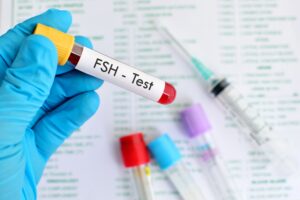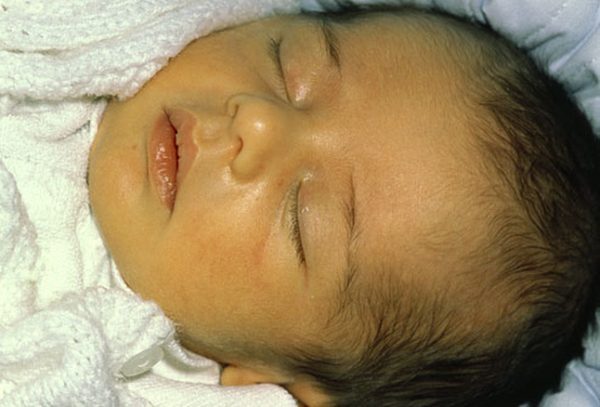
Follicle-stimulating hormone (FSH) affects the functioning of the ovaries and is crucial in sexual development and reproduction. It operates in coordination with luteinizing hormone (LH).
What is Follicle-Stimulating Hormone (FSH)?
Produced by the pituitary gland, it plays a vital role in the reproductive system in men and women. It is responsible for regulating the function of ovaries and testes and plays a significant role in pubertal development. These hormone levels often fluctuate during the entire menstrual cycle and peak just before ovulation. Some women experience low FSH levels which can lead to various symptoms including irregular menstrual cycle, low libido, and hot flashes.
Why is the FSH level low in Females?
Lower-than-normal FSH levels lead to insufficient development throughout puberty in children. In adults, they result in impaired testicular or ovarian function, which may cause infertility. This disorder, known as hypogonadotropic-hypogonadism, is typically brought on by problems with the hypothalamus or pituitary gland. Here are some of the issues that cause low FSH levels in females.
Pituitary Gland Issues
A rare disorder known as hypopituitarism occurs when your pituitary gland produces insufficient amounts of one, many, or all of the hormones it produces. Therefore, hypopituitarism may lead to insufficient FSH. Pituitary adenomas are among the most common causes of primary hypopituitarism. Your pituitary gland may be under pressure or have blood supply blocked to it if the adenoma is larger than normal or continues to grow.
Hypothalamus Issues
Kallmann syndrome is a genetic disorder where the hypothalamus doesn’t produce sufficient gonadotropin-releasing hormone (GnRH). Insufficient GnRH leads to decreased FSH and sex hormone levels. Without treatment, those with Kallmann syndrome will not experience puberty and cannot have biological offspring.
Symptoms of low-level FSH in Women’s Bodies?
The inability to conceive itself is a symptom that shows low levels of FSH in women’s bodies. The physical and emotional struggle that one faces can be the most prominent symptom and require medical attention as soon as possible. Consult with the best gynecologist in Trivandrum, and they will guide you in the right direction and help you give that catered support even while treating to improve your FSH levels. Insufficient FSH levels can impact the reproductive system and lead to symptoms like:
 Irregular menstrual cycle: Women with low FSH levels often experience irregular menstrual cycles. FSH plays a crucial role in the development of ovarian follicles, and decreased levels can interfere with the regular menstrual cycle, resulting in irregular periods or the absence of menstruation.
Irregular menstrual cycle: Women with low FSH levels often experience irregular menstrual cycles. FSH plays a crucial role in the development of ovarian follicles, and decreased levels can interfere with the regular menstrual cycle, resulting in irregular periods or the absence of menstruation.
Low libido: People who have low FSH levels might notice a decline in their sexual desire. Taking the time to understand hormonal balance and consulting with a medical professional can help address any issues.
Hot flashes: Decreased FSH levels can affect estrogen levels in females, causing menopause-like symptoms like hot flashes and night sweats.
Does low FSH affect Female Fertility?
FSH primarily assists in regulating the menstrual cycle for women who are menstruating. FSH prompts the growth of follicles on the ovary and prepares the eggs for ovulation. Once the follicles grow larger, they start releasing estrogen and a small amount of progesterone into your bloodstream.
The menstrual cycle includes a phase called ovulation. It happens around day 14 in a 28-day menstrual cycle. Ovulation refers to the release of an egg from the ovary.
From days six to 14 of the menstrual cycle, FSH stimulates the development of follicles in one of the ovaries. However, only one of the developing follicles becomes a fully mature egg between days 10 and 14. Around day 14 of the menstrual cycle, a surge in LH leads to the rupture of the mature follicle and the release of the egg (ovulation).
Also Read: What is PCOS? PCOS Symptoms, Causes, Diagnosis, and Treatment
Once ovulation occurs, the ruptured follicle transforms into a temporary endocrine gland called the corpus luteum, which secretes progesterone in large amounts. The release of FSH is prevented by progesterone, which aids in the preparation of the uterine lining for pregnancy.
The egg embarks on a five-day journey from the fallopian tube to the uterus. Pregnancy occurs when an egg is successfully fertilized by a sperm. In the absence of fertilization, the corpus luteum deteriorates as the cycle nears its end. Following a decline in progesterone production, the next menstrual cycle starts as FSH levels increase and you get your period.
Get yourself checked thoroughly for any infertility-related issues at the best female infertility clinic near you.
When attempting to conceive, it’s important to have a follicle-stimulating hormone level below 10mIU/ml. Pregnancy can become more challenging when FSH levels are imbalanced, as it impacts your menstrual cycle and ovulation.
When your egg quality and quantity diminish, your body will respond by producing more FSH to enhance ovarian function. Women going through premature or approaching menopause often experience this. The body produces more FSH to maintain a healthy ovarian reserve despite low estrogen levels.
Those with PCOS should monitor their FSH levels, particularly the LH to FSH ratio. Although the FSH levels of women with PCOS may be normal, the LH to FSH ratio is often imbalanced. The LH to FSH ratio is typically 1:1 in young women without PCOS, but women with PCOS may have a ratio as high as 2:1 or 3:1. The irregular ratio interferes with ovulation.
Treatments for improving low FSH levels
The treatments can differ greatly depending on your FSH levels, underlying causes, and specific circumstances, such as being a woman in her late 30s trying to conceive. To manage FSH levels during fertility treatments, a specific regimen of injections and/or pills must be followed. Hormone replacement therapy (HRT) may also be prescribed in certain instances. HRT utilizes medication in various forms (tablets, gel, patches, or rings) to regulate hormone levels (estrogen, progesterone, testosterone). Your FSH levels can be improved by making this adjustment and strictly following your medical team’s instructions.
Also Read: Menstrual Cycle and Your Health
Knowing your FSH levels is crucial for women trying to conceive. An FSH levels test may be suggested by your doctor to determine the FSH amount in your blood. The doctor will use the results to identify any underlying fertility problems. At KJK Hospital, we offer the best infertility treatment by accurately identifying the underlying issue. Our team of expert gynecologists and fertility specialists will assess your FSH levels through tests and examine how it affects your fertility. Based on your medical evaluation and test results, we’ll suggest appropriate treatment plans to bring your FSH levels back to normal. If you are struggling with infertility, then book an appointment with us and let our experienced doctors help you on your journey to parenthood.
Feel free to contact us for appointments and queries.
Phone Numbers: 0471-2544080, 2544706
Email: info@kjkhospital.com






